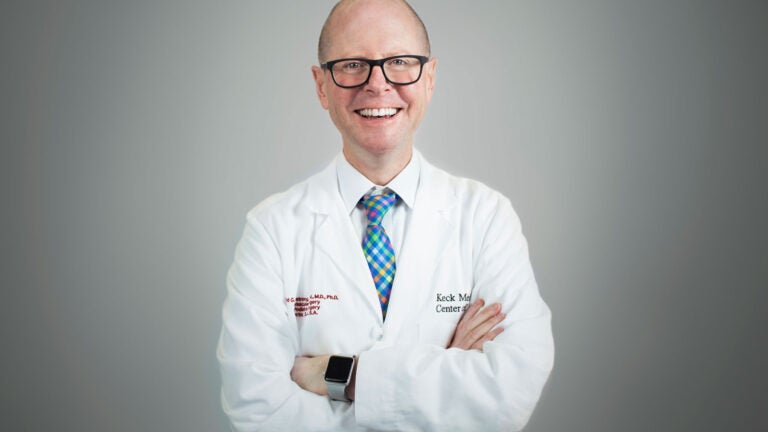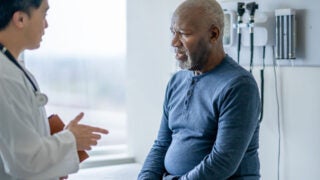
Foot surgeon David Armstrong collaborates on a program to prevent amputation. (Photo/Hannah Benet)
Surgeon dedicates himself to advancing diabetic foot care
Published more than 500 times, “toe mechanic” David Armstrong is a self-proclaimed geek
A diabetes-related amputation takes place every 20 seconds somewhere in the world.
Podiatric surgeon David Armstrong is one of the medical professionals tasked with performing such procedures. But if he has his way, it’s something he’ll be doing much less.
To achieve that goal, Armstrong has developed the Southwestern Academic Limb Salvage Alliance, a clinical and research collaboration dedicated to advancing diabetic foot care and preventing amputation. Here are five things to know about the professor of clinical surgery at the Keck School of Medicine of USC.
1. He regularly partners with USC’s wound management physical therapy team to treat patients.
He calls it “toe, flow and go.” The self-proclaimed “toe mechanic” (podiatric surgeon) partners with “flow doctors” (vascular surgeons) to determine how best to treat the wound, and whether it’s caused by a blood flow deficiency. Afterward, the “go doctors” (wound management physical therapists) help the patient get back to a healthy, active lifestyle.
2. He considers himself the luckiest “toe mechanic” in the world.
Armstrong’s father was also a podiatric surgeon. Armstrong recalls growing up around his father’s Santa Maria practice and seeing the hard work he and his colleague put into their specialty. “I saw all the good that came out of the work they did to help people move around and navigate their world a bit better,” he said. “I feel like I have no excuse but to pay it forward, and that’s what really drives the work we are doing now.”
3. He earned his master’s and two of his doctorates in the U.K.
Armstrong traveled to Europe, with hopes of working with experts he admired, such as Cardiff University Professor Sir Keith Harding and University of Manchester Professor Andrew J.M. Boulton, president-elect of the International Diabetes Federation. “Going abroad to study was an excuse to go work with people I wanted to be my mentors,” he said. “These are men and women I still admire and collaborate with two decades later.”
4. He has been published more than 500 times but still manages to find time to sleep.
Armstrong considers his vocation one of his many avocations, so he admits he’s always writing or thinking about his work, even after hours. “I work with so many great and incredibly smart people, so it is really exciting to do the work. Plus, knowing that I can reach thousands of clinicians who can then use our research to improve care for thousands of patients is really how we make a change in the world. It’s like a pyramid scheme for good.”
5. He put nearly 2,000 miles on his Segway through Chicago.
In the early 2000s, when Armstrong was living in the Windy City, he needed to travel between his clinic, the operating room and his office, which were all separated by a quarter-mile. To cut travel time, he invested in a Segway. “As someone who measures how people get around in the world, it’s a really novel device. As geeky as it is, [wife] Tania is still with me, and my colleagues all know my high level of geek, so I’m doing all right,” he said with a laugh.



